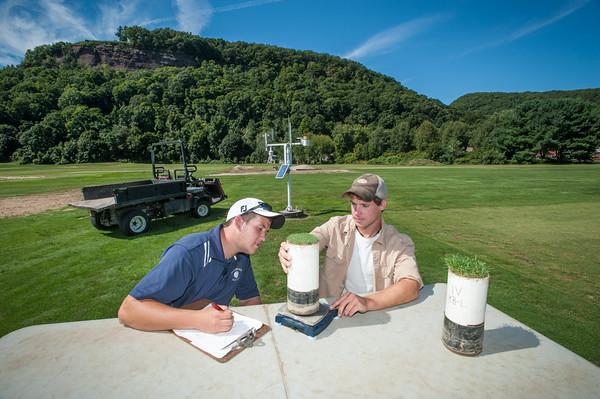In Our Spotlight
Joseph Troll Turf Research Facility, South Deerfield, Massachusetts
If you stand atop Mount Sugarloaf in South Deerfield, Massachusetts and turn your eyes to the base of the mountain to the south, you could well imagine you are gazing upon a lush patchwork quilt in shades of green. In fact, you would be observing the well-defined square plots that form research fields along the Connecticut River. Thanks to the ground-breaking turfgrass research conducted by University of Massachusetts professor Joseph Troll forty years ago, the facility on River Road in South Deerfield has evolved into one of the premier turf research centers in the Northeast.
Mission
The mission of this research center is clear: to develop, research, gather, and share knowledge on safe, efficient, economically-viable and environmentally-sound turf management with emphasis on natural resource protection. University of Massachusetts researchers publish extensively in professional and trade journals and they also work collaboratively with colleagues in universities throughout the country. Research is typically conducted at the Center during every month of the year. During the growing season, as many as thirty or more separate or interrelated projects may be underway at any given time. These projects cover topics from selection and uses of turf to pest management, environmental impacts and much more.
Or, in another way of saying it: “Mission Being Accomplished.”
Turf Researchers
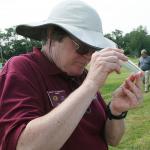 Patricia J. Vittum is senior author of "Turfgrass Insects of the United States and Canada," Second Edition, widely regarded as the bible of turf entomology. Her research interests involve the biology and management of several insects. Professor Vittum seeks ways to manage turf insect pests (e.g., white grubs, annual bluegrass weevils) using the smallest possible rate of insecticide applied at the optimum time. Her trials help to identify new approaches (chemical and non-chemical) that can provide better "results" (that would be more dead bugs).
Patricia J. Vittum is senior author of "Turfgrass Insects of the United States and Canada," Second Edition, widely regarded as the bible of turf entomology. Her research interests involve the biology and management of several insects. Professor Vittum seeks ways to manage turf insect pests (e.g., white grubs, annual bluegrass weevils) using the smallest possible rate of insecticide applied at the optimum time. Her trials help to identify new approaches (chemical and non-chemical) that can provide better "results" (that would be more dead bugs).
Professor Vittum received the prestigious U.S. Golf Association’s Green Section Distinguished Service Award in 2015, and has received similar recognition from several other associations, including Metropolitan Golf Course Superintendents Association (1997), New York State Turfgrass Association (2013), Alumni Turf Group (2014), and Connecticut Association of Golf Course Superintendents (2015).
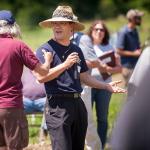 Geunhwa Jung has been involved in turf research for 15 years, nine of those years at the University of Massachusetts Amherst. His program has provided valuable, practical information on management strategies of turfgrass diseases to practitioners of all kinds, including: homeowners, lawn-care companies, park and athletic managers, and golf course superintendents. Professor Jung has helped these ‘boots on the ground’ people with educational talks, diagnostic site visits, fungicide resistance assays and Extension publications. He processes several requests annually for services through DNA fingerprinting of Kentucky bluegrass and Bermuda grass.
Geunhwa Jung has been involved in turf research for 15 years, nine of those years at the University of Massachusetts Amherst. His program has provided valuable, practical information on management strategies of turfgrass diseases to practitioners of all kinds, including: homeowners, lawn-care companies, park and athletic managers, and golf course superintendents. Professor Jung has helped these ‘boots on the ground’ people with educational talks, diagnostic site visits, fungicide resistance assays and Extension publications. He processes several requests annually for services through DNA fingerprinting of Kentucky bluegrass and Bermuda grass.
 Scott Ebdon’s research focuses on reducing water, fertilizer, and pesticide inputs in the maintenance of golf, sports and lawn turf. He performs studies to understand the interaction between turfgrass species-cultivars with their natural and cultural environments. Part of Professor Ebdon’s research is also devoted to identifying cultivars that have superior tolerance to abiotic and biotic stress. Finally, he is developing sustainable practices in order to reduce turfgrass stress. In 2011, Ebdon was the recipient of both the Crop Science Society of America Citation of Excellence for Reviewers and UMass Amherst Residential First-Year Experience Student Choice Award.
Scott Ebdon’s research focuses on reducing water, fertilizer, and pesticide inputs in the maintenance of golf, sports and lawn turf. He performs studies to understand the interaction between turfgrass species-cultivars with their natural and cultural environments. Part of Professor Ebdon’s research is also devoted to identifying cultivars that have superior tolerance to abiotic and biotic stress. Finally, he is developing sustainable practices in order to reduce turfgrass stress. In 2011, Ebdon was the recipient of both the Crop Science Society of America Citation of Excellence for Reviewers and UMass Amherst Residential First-Year Experience Student Choice Award.
 Michelle DaCosta’s work is all about understanding grass under stress. Her research at the turf facility is focused on stress physiology of cool-season turf grasses. Much of her research efforts are highly-collaborative with colleague Scott Ebdon.
Michelle DaCosta’s work is all about understanding grass under stress. Her research at the turf facility is focused on stress physiology of cool-season turf grasses. Much of her research efforts are highly-collaborative with colleague Scott Ebdon.
Specifically, Professor DaCosta works to identify best management practices aimed at water conservation and increased summer stress tolerance to help reduce inputs into turfgrass systems. She examines management strategies to enhance winter survival and spring establishment. Finally, she screens different grasses to identify the most stress-tolerant cultivars and species under reduced irrigation.
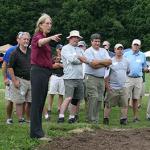 Lesley (Mickey) Spokas is an expert on wetlands. An on-site constructed wetland was created at the research facility to act as a demonstration area. She is able to display the function of constructed wetlands to treat water used by golf courses, lawn care companies, and other turf professionals. These professionals wash their equipment daily, and the wash water may contain fertilizers, pesticides and oil and grease, all of which can be successfully removed in a properly-sized and designed constructed wetland.
Lesley (Mickey) Spokas is an expert on wetlands. An on-site constructed wetland was created at the research facility to act as a demonstration area. She is able to display the function of constructed wetlands to treat water used by golf courses, lawn care companies, and other turf professionals. These professionals wash their equipment daily, and the wash water may contain fertilizers, pesticides and oil and grease, all of which can be successfully removed in a properly-sized and designed constructed wetland.
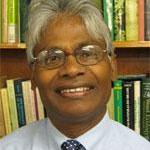 Prasanta Bhowmik, professor of weed science, has been at the University of Massachusetts Amherst since 1981. Professor Bhowmik is responsible for teaching, research and extension education in weed management for turfgrass systems.
Prasanta Bhowmik, professor of weed science, has been at the University of Massachusetts Amherst since 1981. Professor Bhowmik is responsible for teaching, research and extension education in weed management for turfgrass systems.
For cool-season turfgrass systems, his research focuses on how to reduce herbicide use for weed management strategies with emphasis on cultural practices, sequential applications, reduced rate use, organic products, and growth regulators. Professor Bhowmik’s research has been published in over 125 journal articles and several book chapters, 450 abstracts and reports, and 80 extension and consumer articles.
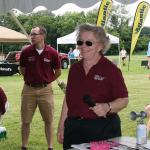 Mary C. Owen is an Extension Turf Specialist for the University of Massachusetts. She directs the UMass Extension Turf Program toward its goal of helping industry professionals, businesses, organizations and municipalities meet the challenges posed by the management of turf in urban, suburban and rural environments. Owen engages the turf industry and greater community in collaborative projects with UMass, addressing issues of high concern. By providing scientifically-sound information on the implementation of best management practices, the adoption of integrated pest management systems, and the protection of water and other environmental resources, she brings the teaching and research expertise of the University to bear in solving problems faced by turf managers and communities alike. Owen is a founding member of the New England Sports Turf Managers Association and works closely with the sports turf industry on statewide, regional and national levels.
Mary C. Owen is an Extension Turf Specialist for the University of Massachusetts. She directs the UMass Extension Turf Program toward its goal of helping industry professionals, businesses, organizations and municipalities meet the challenges posed by the management of turf in urban, suburban and rural environments. Owen engages the turf industry and greater community in collaborative projects with UMass, addressing issues of high concern. By providing scientifically-sound information on the implementation of best management practices, the adoption of integrated pest management systems, and the protection of water and other environmental resources, she brings the teaching and research expertise of the University to bear in solving problems faced by turf managers and communities alike. Owen is a founding member of the New England Sports Turf Managers Association and works closely with the sports turf industry on statewide, regional and national levels.
 Jason D. Lanier has worked with UMass Extension since 2000. As an educator, Lanier provides myriad support including project development and management, facilitation of educational programs and materials, and frequent interaction with the industry and the greater public. He has served as an editor and contributing author for numerous publications and provides academic instruction for select workshops and certificate programs, including UMass Extension’s Green School and Winter School for Turf Managers. A personally-satisfying aspect of Lanier’s work with Extension involves the use of available technologies to educate practitioners quickly and efficiently, and to assist them in making informed, responsible, and effective turf management decisions.
Jason D. Lanier has worked with UMass Extension since 2000. As an educator, Lanier provides myriad support including project development and management, facilitation of educational programs and materials, and frequent interaction with the industry and the greater public. He has served as an editor and contributing author for numerous publications and provides academic instruction for select workshops and certificate programs, including UMass Extension’s Green School and Winter School for Turf Managers. A personally-satisfying aspect of Lanier’s work with Extension involves the use of available technologies to educate practitioners quickly and efficiently, and to assist them in making informed, responsible, and effective turf management decisions.
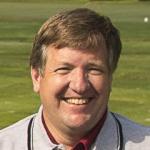 Randall Prostak joined the University of Massachusetts in 1994 and has worked with the Extension Turf Program since 1998. The focus of his program is turf weed management along with weed management in landscape, nursery, hay and pasture systems.
Randall Prostak joined the University of Massachusetts in 1994 and has worked with the Extension Turf Program since 1998. The focus of his program is turf weed management along with weed management in landscape, nursery, hay and pasture systems.
Prostak is a frequent presenter at industry seminars and extension educational events throughout New England and New York. He is an instructor in certificate programs including University of Massachusetts Green School and International Winter School for Turf Managers. Prostak developed, and is the primary instructor for, the UMass Extension Invasive Plant Certification Program. He is responsible for weed identification and advice on management strategies in the UMass Extension Plant Diagnostic Laboratory.
 Robert Wick’s primary interest lies within commercial horticulture. Wick joined the UMass faculty in 1984. He has more than 20 years of experience in turfgrass pathology and nematology and currently directs the UMass Plant Diagnostic Laboratory. Professor Wick teaches plant pathology, diagnostic plant pathology, forest pathology and diseases of turfgrasses. His research is primarily in population dynamics and management of plant parasitic nematodes in turf but also includes fungicide resistance and diseases of vegetables and ornamental plants.
Robert Wick’s primary interest lies within commercial horticulture. Wick joined the UMass faculty in 1984. He has more than 20 years of experience in turfgrass pathology and nematology and currently directs the UMass Plant Diagnostic Laboratory. Professor Wick teaches plant pathology, diagnostic plant pathology, forest pathology and diseases of turfgrasses. His research is primarily in population dynamics and management of plant parasitic nematodes in turf but also includes fungicide resistance and diseases of vegetables and ornamental plants.
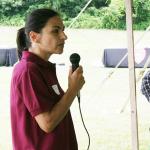 Angela Maderias focuses on commercial horticulture. She is responsible for diagnosing diseases for floriculture, vegetable crops, and turf, and gives recommendations for their control. Maderias also participates in extension educational activities.
Angela Maderias focuses on commercial horticulture. She is responsible for diagnosing diseases for floriculture, vegetable crops, and turf, and gives recommendations for their control. Maderias also participates in extension educational activities.
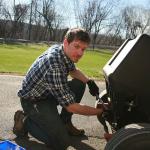 Jim Poro's turf is healthy grass (pun intended). As superintendent for the Joseph Troll Turf Research Facility, he is responsible for keeping the quality of this turf farm in excellent condition. Poro’s goal is to help create environmentally-sensitive practices while reducing inputs (irrigation, pesticides) as he maintains healthy turf for landscaping, sports and golf turf. He also maintains all mowing equipment and irrigation systems. In order to help students prepare for employment post-graduation, he teaches them about ongoing research and how to maintain the facility.
Jim Poro's turf is healthy grass (pun intended). As superintendent for the Joseph Troll Turf Research Facility, he is responsible for keeping the quality of this turf farm in excellent condition. Poro’s goal is to help create environmentally-sensitive practices while reducing inputs (irrigation, pesticides) as he maintains healthy turf for landscaping, sports and golf turf. He also maintains all mowing equipment and irrigation systems. In order to help students prepare for employment post-graduation, he teaches them about ongoing research and how to maintain the facility.
With this twenty-acre research facility conducting ongoing experiments, Poro works closely with world-class researchers, assisting them in their various research projects. These range from tests on varieties of turf grass, to measuring water usage, nutrition, wear of sports on turf, biological control of insects and weeds and low-temperature disease control.
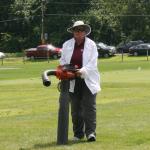 Laurie Brocklesby joined the UMass Turf Program as a laboratory technician in Patricia Vittum's laboratory in 2007. She organizes all the details behind the scenes to ensure that field and lab trials run smoothly. Laurie has become a well-recognized face of the turf program, representing UMass at the regional and national trade shows, and maintaining connections with countless turf managers around the country.
Laurie Brocklesby joined the UMass Turf Program as a laboratory technician in Patricia Vittum's laboratory in 2007. She organizes all the details behind the scenes to ensure that field and lab trials run smoothly. Laurie has become a well-recognized face of the turf program, representing UMass at the regional and national trade shows, and maintaining connections with countless turf managers around the country.
